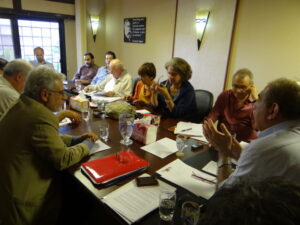
This international initiative is composed of prominent civil society figures from Europe and Latin America (list attached) representing all those concerned with peace and justice in Syria. Its aim is to contribute to the end of the war and the suffering by helping create favourable conditions for the advancement of the political process through dialogue and negotiations.
In order to achieve such an aim, we met with State officials at high levels and various groups and parties of the opposition inside and outside the country, along with religious organizations and international and non-governmental bodies.
We have been received, have been informed on the aspects and essence of the conflict, and have been heard.
On the basis of the discussions held, the Initiative identified key areas of agreement and drew the following conclusions:
1 The conflict cannot be solved by military means.
2 There is a need for a viable political solution based on dialogue and negotiations and aiming at drawing up a political transitional framework.
3 A sectarian war is now in the making and there is a real possibility of it becoming transnational, making peace all that more urgent.
4 The conflict has had a catastrophic impact on the Syrian people as 6.8 million people are in need of assistance, according to interviewed United Nations officials.
5 The inflow and funding of weapons, soldiers, foreign fighters and militia from the outside aimed at continuing the war must all stop.
6 The embargo has increased misery among the population and is a factor, among others, affecting the delivery of the much needed assistance.
7 The Geneva II meeting must be attended and supported by all relevant parties in a way that genuinely meets the social aspirations of the Syrian people based on justice for the dispossessed, displaced and oppressed.
The Peace-in-Syria initiative agrees with the above considerations.
In the course of its discussions, various suggestions were presented to the parities including the following:
– Organizing a Syrian civil society conference to be held possibly in Austria in support of peace-building and Syrian infrastructure reconstruction with an emphasis on the role played by women in the peace building process.
– Local zones of non-violence around places such as hospitals, schools, cultural and religious centres with the aid of the Red Crescent.
– Good will steps by contending forces on the ground for the release of prisoners, hostages and kidnapped persons, particularly those most vulnerable.
– Formation of a European parliamentary delegation to encourage dialogue among the parties concerned.
The Initiative believes there is no higher moral imperative at this time than that of ending the killing and the suffering in Syria. Further misery must also be avoided by ending the destruction of medical infrastructure and cultural patrimony. Every day that the war continues signifies a further erosion of the social fabric of the nation and therefore the capacity to build a lasting peace based on justice.
We further believe that a genuine solution to the conflict should arise from a political process and outcome consistent with basic democratic and human rights, Syrian sovereignty, principles of international law and international humanitarian law.
We join in advocating for the security of all civilians, particularly vulnerable groups, and call for the strictest adherence to international humanitarian and human rights law including the end of indiscriminate attacks against non-military targets and enhanced humanitarian access for Syrian Red Crescent and others for the delivery and distribution of medicines ending the embargo on the same.
We strongly believe in the fundamental importance of the principle of self-determination in a context of the sovereign territorial and political integrity of Syria based also on freedom of expression and respect for cultural, economic and social rights.
We reject all foreign intervention in the Syrian conflict. We warn against imperial and regional attempts to create sectarian states and redraw the map of the Middle East in order to control the resources and the future of this region while also ignoring the inalienable rights of the Palestinian people. The continuation of military action can only increase external dependence, foreign intervention and the multiplication in the number of victims leading to uncontainable chaos and destruction.
The Initiative will continue its work and promote discussion among the parties of and immediate measures to alleviate suffering and promote Syrian-led reconciliation.
Beirut, June 14, 2013